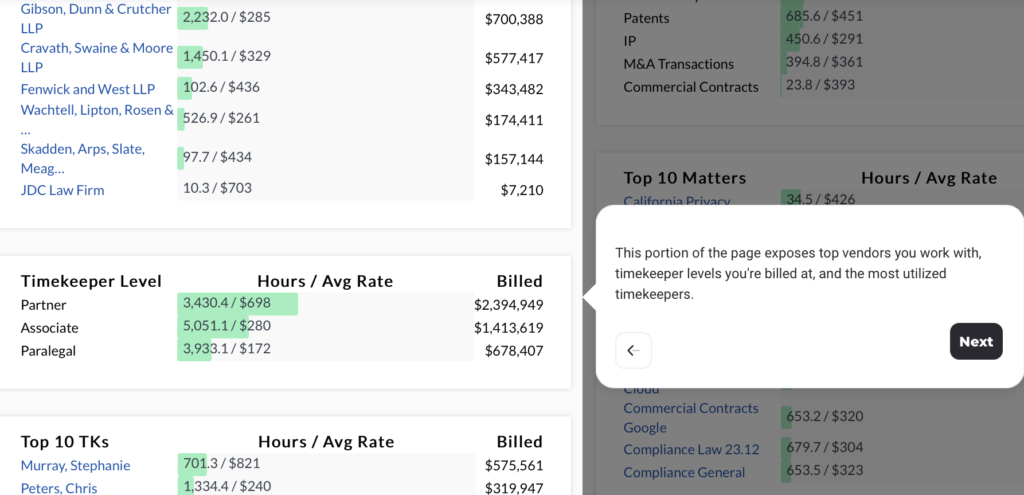5 best practices for hiring new outside legal counsel

When it’s time to hire new outside legal counsel, is your go-to move using the same vendors as your peers? We understand — you’ve got a lot on your plate, and you trust your friends. But if you’re troubled because your outside legal spend is much higher than you’d like it to be, you’re not alone.
Small companies spent an average of $5.9 million on outside legal counsel in 2021, and BTI found that the majority of general counsel just choose the first law firm recommended to them by peers — “even if this firm is recommended just once.”
It’s time to stop choosing new outside legal counsel based on word of mouth. Just because a vendor is a good fit for a friend’s company doesn’t mean they’ll deliver the same ROI for your organization.
Get the most value from your outside legal spend with a more objective assessment by using these 5 tips.
1. Research vendor service offerings and staffing
Your outside counsel are significant investments. Think of it like buying a new car. If you don’t do your research beforehand, you could easily drop thousands on a vehicle that doesn’t have the capabilities you need. Likewise, just because a vendor has a certain practice area (PA) doesn’t mean it’s one of their top practice areas. So, do your homework before picking vendors to find ones that make the most sense for your company.
The simplest way to develop an understanding of the depth and breadth of PAs and the teams behind them is by reviewing vendor websites. Look for vendors who have handled legal matters similar to the work you need handled. You can find this information by reading through PA pages, attorney and paralegal bios, and client testimonials. When evaluating practice areas, also check if any are ranked by Chambers.
Scanning through a vendor website will also give you an idea if they could be used for work across different legal issues, which means a potential volume discount on your end and a closer working relationship. The more a vendor gets to know the ins and outs of your business, the more tailored advice they can provide.
The last factor to think about in your initial review is staffing diversity. While there’s been a push for greater diversity and inclusion in legal for ethical reasons, diversity also adds significant business benefits. Countless studies show that a wider variety of backgrounds and perspectives enhance the quality of work, innovation, and profitability.
While you can skim bios to get a general idea of whether a vendor’s roster is a homogenous group, you can also ask them to share their American Bar Association Model Diversity Survey results, if available, for concrete data on individuals from underrepresented backgrounds. Additionally, see if you can find any information on their organization’s D&I work — seek out those who “walk the walk.”
2. Check pricing against your usual vendor rates
Instead of relying on educated guesses to determine if a prospective vendor is reasonably priced, compare their costs with the average rates of your current vendors. Legal departments at small companies are aiming to save around 14% by 2024, and this data-driven approach will help you avoid spending more than necessary on overpriced vendors.
You can make this comparison in spreadsheets, but there’s a lot less manual work and time spent when using a legal spend management platform.
This type of legal software keeps all your spend information in one dashboard, giving you clear insight into how much you’re spending and on which vendors. This will help you stay on target as you work to keep outside expenses in check.

A legal management platform makes it easy to find out the average cost of your vendors. (Source: SimpleLegal)
You can easily drill down into granular vendor metrics like spend by vendor, practice area, or timekeeper with the click of a button.
When assessing prospective vendors, you should also ask if they’re amenable to alternative fee arrangements (AFAs). Compared to hourly rates, these types of billing models bring more predictability to your legal spend because you know the final cost up front. These arrangements also help you avoid bill padding, where attorneys round up their time or charge for non-billable work — both of which result in a higher price tag for you.
3. Consider alternative legal service providers
If you’re just going with the first law firm suggested to you, you could miss out on the substantial benefits of working with an alternative legal service provider (ALSP). These vendors are growing in popularity, offering many of the same services as traditional law firms for lower prices.
According to the 2021 EY Law Survey, the use of ALSPs grew by 13% from 2019 to 2021. This is largely due to ALSPs’ use of innovative technology for faster, more efficient work that doesn’t compromise quality. For example, while 1 in 4 ALSPs use some form of artificial intelligence, just 7% of law firms do the same.
This use of tech translates directly to cost savings for you. For example, ALSP Percipient — whose tagline is in fact “legal services powered by technology” — saved a client around $400,000 just by taking over document review and compliance for them.
With automation and AI on their side, ALSPs are a particularly smart option for low-level, high-volume work like document review, legal research, and contract management. Taking this work off your corporate legal department’s plate gives them more time to focus on strategic priorities, like optimizing spend. You’ll also reduce the risk of costly disengagement and burnout, especially on already-busy teams that don’t have access to legal management software.
4. Evaluate vendor data security and privacy protection
Making sure vendors have appropriate cybersecurity measures in place is a necessary risk management practice. The average cost of a data breach hit a record of $4.24 million in 2021, and law firms are major targets for cybercriminals. The American Bar Association actually found that 1 in 4 survey respondents had worked with a law firm that suffered a data breach.
Avoid the fallout of a third-party data breach by asking potential vendors about how their organization secures data. If you’re in contact with an attorney who doesn’t know, ask to connect with their IT department to ask:
- Has your firm encountered a data breach?
- If yes, when? And what was the cause? What steps were taken to prevent a recurrence?
- What cybersecurity tools and processes does your firm use to protect data?
- Do you have a data retention policy?
- Do you have a cybersecurity incident response policy?
- Do you have cybersecurity insurance?
Having this conversation up front can save you thousands in the long run.
Learn more about how to avoid costly data breaches with “5 ways corporate legal departments can prioritize data privacy.”
5. Get to know prospects as people, not just professionals
The relationship between outside legal counsel and your in-house lawyers plays a key role in whether a matter will succeed or fail. Whether external attorneys mesh well with in-house counsel is just as important as their legal advice, so evaluate their soft skills during the interview process. The last thing you want is to invest in a new vendor only to find out that it’s difficult for your legal team to work with them.
The ability to connect with colleagues on a human level fosters strong, positive working relationships. As Meyling Ly Ortiz, Labor & Employment managing counsel for Toyota Motor North America, says, “There’s something compelling about feeling like my outside counsel is ‘seeing’ me as an individual and not just a billable matter.”
These 3 traits are the foundation of those kinds of deep partnerships:
- Communication. Few things are more frustrating than working with unresponsive or unclear outside counsel, especially in the middle of a high-stakes matter. Directly ask about interpersonal communication techniques and typical turnaround times, remembering that effective communication can improve performance by 3.5 times.
- Collaboration. As author John Murphy notes, teamwork gives companies a “competitive advantage” stemming from greater innovation and problem-solving. When people work well together, you’ll win together.
- Kindness. Working with nice people goes a long way in boosting job satisfaction and employee well-being. And when your in-house team is happy with their co-workers, they’re less likely to quit.
Maintain strong outside legal counsel partnerships with vendor management software
It’s difficult to objectively determine how well your vendors are doing for their business and give them valuable feedback when using a manual tool. In fact, just 27% of in-house legal departments formally review vendor performance, according to CLOC’s 2021 State of the Industry Report.
Vendor software can easily track key vendor metrics like matter lifecycle times and compliance with billing guidelines. With this information, you can measure your ROI and have productive, data-driven conversations about vendor successes and areas for improvement. Check out our free demo to see how our vendor management platform will help you make the most of these critical relationships.

